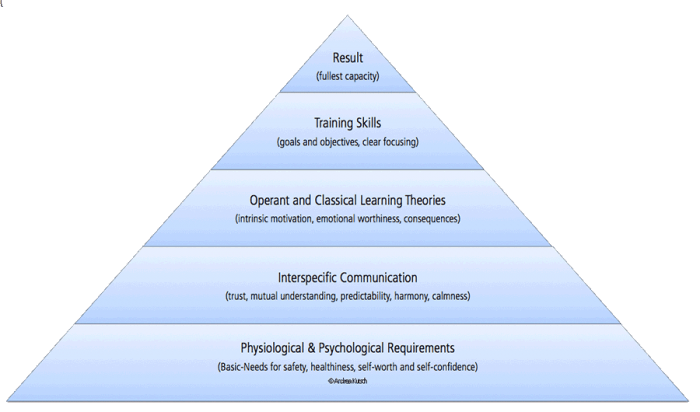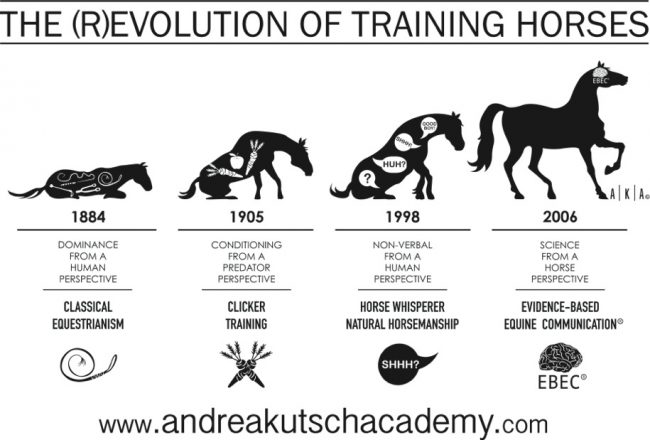THAT’S WHAT EBEC IS ALL ABOUT
Definition:
EBEC (Evidence Based Equine Communication) is the world’s only horse-centric and scientifically based training method. This application to the horse reveals a result in an intrinsically motivated horse, whose fullest potential is reached.
Development:
Through the meaningful combination of scientific knowledge about the brain, instincts, and the natural behavior of the horse mixed with the classic and operant learning theories, Evidence Based Equine Communication has emerged. Evidence Based Equine Communication was developed by Andrea Kutsch and entered on 07.06.2012 as a protected term.
Explanation:
More specifically, EBEC is the training method that is based on the natural behaviors of the horse. We use a horse-centered perspective as a base and are constantly updating the effective training methodology for horses by findings from scientific studies. With the help of Evidence Based Equine Communication appropriately trained people can cause permanent behavioral changes in any horse, substantially increase their performance and reach the horse’s fullest potential. By the smallest means of possible interactions a horse can learn everything that is needed in our civilization and in many different situations. EBEC is applicable for horses of all ages, educational levels and any field of use. Evidence Based Equine Communication is suitable for all branches of the horse industry.
EBEC trains an objective, self-reflective attitude in order to create a positive learning atmosphere for horses and humans. During EBEC training, adrenaline levels in horses and humans are kept low to enable sustainable learning.
The foundation of EBEC is the pyramid shown in Figure 1, which is explained below.

In order to reach a common level with the horse, the basic requirements of the horse and a human are taken as “basic needs”. The Interspecific communication establishes the common language in a lively process, creating a mutual understanding that aims to build a bond based on trust. Using classical learning theories, consequences for horses and humans are predictable and the horse can develop intrinsic motivation. Consequently, a clear goal adopted to the skills and abilities of horse and human relationship can be used in training to reach the full potential in order to achieve the best possible result.
EBEC demands from the trainer not only a horse-centered expertise, but also the knowledge about the application and current results of scientific research.
The observation of natural behaviors (instinctive behavior), information is used logically and purposefully and used according to classical learning theories. As a result, well-founded learning outcomes can be achieved. For this purpose, training plans are created that are tailored to the level of knowledge and the physical constitution of the human as well as the learning behavior and the level of development of the horse.
History

With the publication of the “Gymnasium des Pferde” by Gustav Steinbrecht in 1884, the first epoch of horse training is heralded. The recommendations contained in it were included in Army Service Regulation No. 12 for the training of cavalrymen. These form the basis of the “Guidelines for Riding and Driving” of the FN.
In the second epoch of horse training; conditioning takes place from the perspective of a predator. The basis is a “reward system” over the administration of food after showing the desired reaction. Pavlov observed salivation in dogs in 1905 as a reflex and used this uncoordinated reaction by coupling with a neutral stimulus to elicit a stimulus-response association (Pavlovian effect).
By observing the natural behaviors of wild horses since 1998, a possibility of communication between a human and a horse has been established. The basis is the body language (horsemanship, horse whisperer).
With the introduction of EBEC in 2010, the horse can be trained from a science-based, horse-centered perspective. Here, the brain and the anatomy of the horse, its instincts and the current findings of behavioral science are used with meaningful intent.
The doctrines of EBEC:
The equine centered and scientifically based training method EBEC will be taught at the Andrea Kutsch Academy with the aim of building a worldwide network of horse specialists and equine coaches. The one- and two-day seminars provide a first introduction. Further content can be learned in the course programs.
The theoretical, evidence based content is taught in online webinars and includes lessons as well as integrated homework, educational games, and video analytics, which can be done from home. All theory modules are repeated several times a year and form a flexible course program. In the optional practice phases, the theoretically transmitted content can be applied to the horse. After completion of the courses, certification as an Equine Coach or Equine Master Coach is possible, which is linked to a cooperation agreement with the Andrea Kutsch Academy.
For kids and teens there is the Kids & Youth program.
Your course program starts right here.
Catch the AKA spirit. Live the AKA lifestyle.


